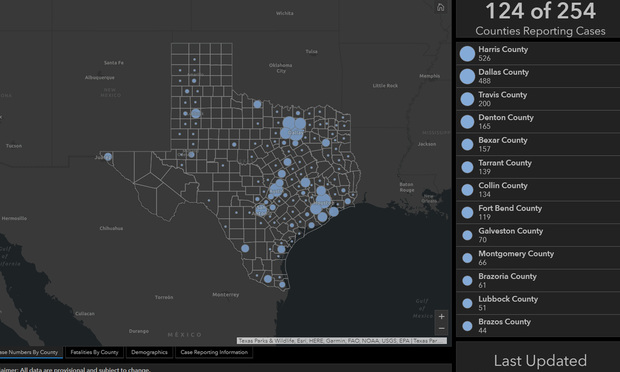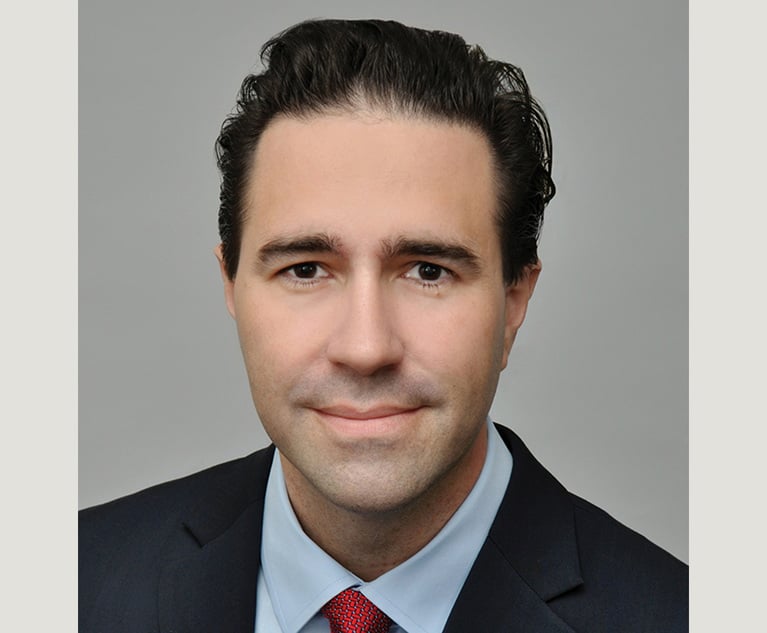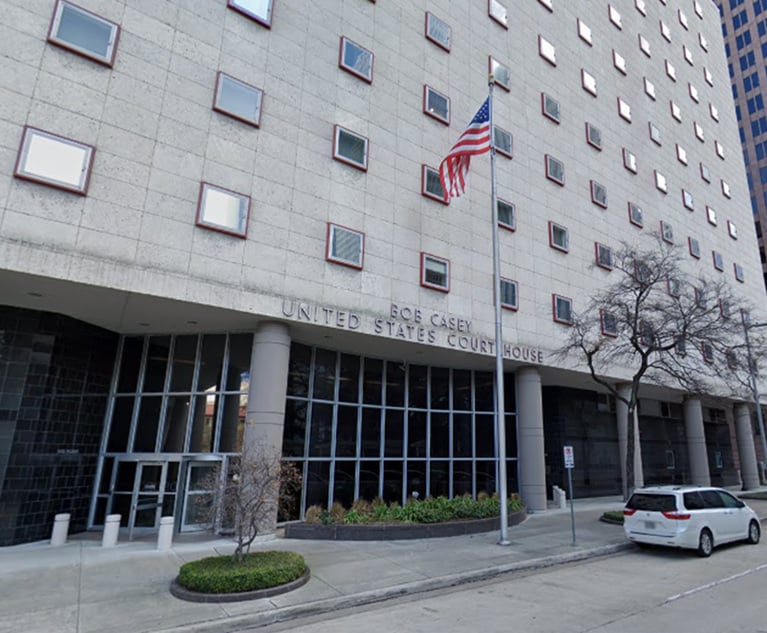Thousands Less: These Numbers Show How COVID-19 Affected Texas Courts, Lawyers
An analysis of civil filings in Texas state courts shows that the number of filings has dropped steadily each week during the month of March, as the coronavirus has spread across the Lone Star State.
March 30, 2020 at 06:01 PM
4 minute read
 This chart shows the 2,877 reported COVID-19 cases in Texas as of Monday, March 30, 2020. Photo: Texas Department of State Health Services
This chart shows the 2,877 reported COVID-19 cases in Texas as of Monday, March 30, 2020. Photo: Texas Department of State Health Services
The number of civil filings dropped steadily in March as the coronavirus shut down Texas courts, and many lawyers started working from home.
In past years, the number of week-by-week civil filings in March has stayed relatively the same—but not this time.
This month: a steady week-by-week decline in filings. And while data showed a steady increase in cases coming into civil courts in recent years, this March saw a steep drop.
The reason: COVID-19, according Jennifer Doan, chairwoman of the litigation section of the State Bar of Texas. And the main reason is because lawyers are human.
"In the last couple of weeks, really since the beginning of the month, their lives have been turned upside down," said Doan, a partner in Haltom & Doan in Texarkana.
As attorneys care for children during the virus outbreak, and juggle work-from-home duties, getting to the courthouse to file lawsuits might not be on the top of their minds, Doan said.
"It's challenging to be productive, when there are greater concerns that need to be addressed immediately," she said.
Texas Lawyer researched civil filing numbers on re:SearchTX, the Texas courts' document-retrieval system, to look at week-by-week filings in March and compare them to the same time frames in past years.
Interactive chart: Place your cursor over the chart to view actual numbers.
Source: re:SearchTX. Graphic: Angela Morris/ALM
Filings have dropped steadily every week: In the first week of the month, there were about 7,500 filings, in the second week there were 6,700, in the third week there were 6,600 and in the fourth week, only 4,700 filings came in. The steady decline is much different than in past years, when roughly the same number of filings came in during all four weeks of March.
Another trend emerged by comparing week-by-week filings in 2017, 2018 and 2019. In earlier years, a clear trend of the civil filings climbing steadily over time, but then this year, a steep decline.
For example, in the first week of March, court data show 20% fewer filings than the first week of March 2019. In the second week, litigants filed 30% fewer civil cases than the same time one year earlier. And the third week of March this year brought 31% fewer filings compared with last year. The trend continued in the final week of the month, with 51% fewer filings at the end of March 2020, compared to the same time in 2019.
The number of civil filings during the fourth week of March this year was lower than it's been in years, dipping 35% below the same period in 2017.
"So many of our practices depend on face-to-face meetings with clients," said State Bar of Texas president-elect Larry McDougal. "We're not having those any more."
Some attorneys who don't have the technology to work remotely from home have simply closed down their practices temporarily, McDougal explained. Other counsel are setting up work-from-home practices.
"We are all on a learning curve right now," McDougal said.
Doan, the Texas Bar litigation chairwoman, said that the litigation decrease is temporary, not permanent. She expects the numbers to rise again in May or June, or perhaps take longer, if social distancing remains in place into the summer.
"I don't think it is a permanent issue," she said. "Historically, when there's a downturn in the economy, more companies and individuals resort to litigation."
This content has been archived. It is available through our partners, LexisNexis® and Bloomberg Law.
To view this content, please continue to their sites.
Not a Lexis Subscriber?
Subscribe Now
Not a Bloomberg Law Subscriber?
Subscribe Now
NOT FOR REPRINT
© 2025 ALM Global, LLC, All Rights Reserved. Request academic re-use from www.copyright.com. All other uses, submit a request to [email protected]. For more information visit Asset & Logo Licensing.
You Might Like
View All

Conspiracy Suits Against Quinn Emanuel, Roc Nation Moved to Federal District Court

JCPenney Seeks Return of More Than $1.1M From Jackson Walker For Bankruptcy Work
3 minute read
Ex-Appellate Court Judges Launch Boutique Focused on Plaintiffs Appeals
2 minute readTrending Stories
Who Got The Work
J. Brugh Lower of Gibbons has entered an appearance for industrial equipment supplier Devco Corporation in a pending trademark infringement lawsuit. The suit, accusing the defendant of selling knock-off Graco products, was filed Dec. 18 in New Jersey District Court by Rivkin Radler on behalf of Graco Inc. and Graco Minnesota. The case, assigned to U.S. District Judge Zahid N. Quraishi, is 3:24-cv-11294, Graco Inc. et al v. Devco Corporation.
Who Got The Work
Rebecca Maller-Stein and Kent A. Yalowitz of Arnold & Porter Kaye Scholer have entered their appearances for Hanaco Venture Capital and its executives, Lior Prosor and David Frankel, in a pending securities lawsuit. The action, filed on Dec. 24 in New York Southern District Court by Zell, Aron & Co. on behalf of Goldeneye Advisors, accuses the defendants of negligently and fraudulently managing the plaintiff's $1 million investment. The case, assigned to U.S. District Judge Vernon S. Broderick, is 1:24-cv-09918, Goldeneye Advisors, LLC v. Hanaco Venture Capital, Ltd. et al.
Who Got The Work
Attorneys from A&O Shearman has stepped in as defense counsel for Toronto-Dominion Bank and other defendants in a pending securities class action. The suit, filed Dec. 11 in New York Southern District Court by Bleichmar Fonti & Auld, accuses the defendants of concealing the bank's 'pervasive' deficiencies in regards to its compliance with the Bank Secrecy Act and the quality of its anti-money laundering controls. The case, assigned to U.S. District Judge Arun Subramanian, is 1:24-cv-09445, Gonzalez v. The Toronto-Dominion Bank et al.
Who Got The Work
Crown Castle International, a Pennsylvania company providing shared communications infrastructure, has turned to Luke D. Wolf of Gordon Rees Scully Mansukhani to fend off a pending breach-of-contract lawsuit. The court action, filed Nov. 25 in Michigan Eastern District Court by Hooper Hathaway PC on behalf of The Town Residences LLC, accuses Crown Castle of failing to transfer approximately $30,000 in utility payments from T-Mobile in breach of a roof-top lease and assignment agreement. The case, assigned to U.S. District Judge Susan K. Declercq, is 2:24-cv-13131, The Town Residences LLC v. T-Mobile US, Inc. et al.
Who Got The Work
Wilfred P. Coronato and Daniel M. Schwartz of McCarter & English have stepped in as defense counsel to Electrolux Home Products Inc. in a pending product liability lawsuit. The court action, filed Nov. 26 in New York Eastern District Court by Poulos Lopiccolo PC and Nagel Rice LLP on behalf of David Stern, alleges that the defendant's refrigerators’ drawers and shelving repeatedly break and fall apart within months after purchase. The case, assigned to U.S. District Judge Joan M. Azrack, is 2:24-cv-08204, Stern v. Electrolux Home Products, Inc.
Featured Firms
Law Offices of Gary Martin Hays & Associates, P.C.
(470) 294-1674
Law Offices of Mark E. Salomone
(857) 444-6468
Smith & Hassler
(713) 739-1250






